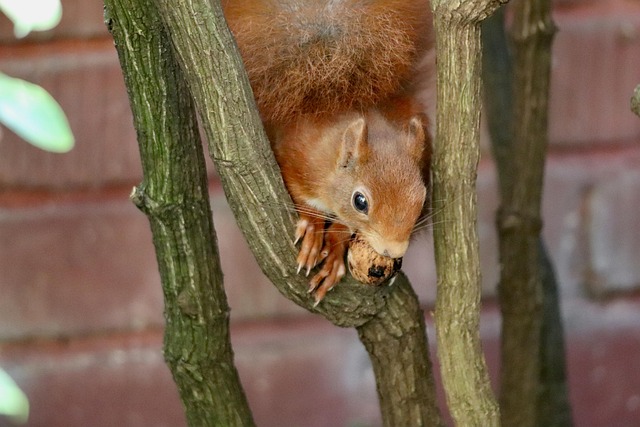Squirrels, attracted by bird feeders, can turn peaceful gardens into chaotic scenes. While deterring them is challenging, non-lethal strategies like reflective objects, motion-activated sprinklers, scent repellents, and physical barriers (wire mesh, netting) prioritize humane solutions for coexistence. Professional squirrel control services offer specialized techniques such as habitat modification, exclusion methods, and live trap removal to safely address infestations around bird feeders. Maintenance involves regular cleaning, sanitizing, and using squirrel-resistant feeder designs or protective caps to prevent future issues while fostering a balanced ecosystem.
Protecting your bird feeders and outdoor spaces from mischievous squirrels can be a challenge, but with the right strategies, it’s achievable. This comprehensive guide explores various approaches to deterring squirrels, focusing on non-lethal methods that are both humane and effective. We delve into understanding squirrel behavior, offering insights into what attracts them to bird feeders. Additionally, we discuss the role of professional squirrel control services for persistent infestations. Learn how to maintain your outdoor haven after successful squirrel removal with our practical tips.
Understanding Squirrel Behavior and Their Attraction to Bird Feeders
Squirrels, with their agile nature and keen senses, are naturally attracted to bird feeders and outdoor spaces filled with food sources. Understanding their behavior is crucial when it comes to effective squirrel control services. These rodents have an incredible ability to detect even the faintest traces of food, making them persistent visitors to gardens and parks. Their playful antics and relentless pursuit of nourishment can quickly transform a peaceful outdoor retreat into a chaotic scene, as they jump from branch to branch, scurrying up trees, and constantly attempt to access bird feeders.
The attraction to bird feeders is multifaceted; not only do they provide an abundant food source but also offer a safe haven for squirrels to observe their surroundings while feeding. Their keen eyesight allows them to spot potential threats from a distance, making the feeders a strategic choice for these intelligent creatures. To deter squirrels, one must consider innovative strategies that respect both the animals’ natural behavior and human safety, ensuring peaceful coexistence without sacrificing outdoor enjoyment.
Non-Lethal Methods for Deterring Squirrels from Outdoor Spaces
Many property owners enjoy attracting birds to their outdoor spaces with bird feeders, but this can often lead to unwelcome visitors—squirrels. While it might seem tempting to resort to lethal methods, there are numerous non-lethal strategies that prove effective in squirrels control. These methods prioritize humane solutions and can be implemented by anyone looking to keep squirrels at bay without causing harm.
One of the most popular approaches is using visual deterrents like reflective objects or motion-activated sprinklers. Squirrels are easily startled by sudden movements and reflections, which can discourage them from approaching. Another option is employing scent repellents; specific scents like cayenne pepper, garlic, or certain essential oils can repel squirrels naturally. Additionally, physical barriers such as wire mesh or netting can be installed around feeders to prevent squirrel access while allowing birds to enter freely. These non-lethal methods offer sustainable solutions for squirrels control, ensuring a harmonious coexistence between humans and wildlife.
The Role of Professional Squirrel Control Services
When dealing with persistent squirrel problems, many homeowners turn to professional squirrel control services for effective and humane solutions. These experts are equipped with specialized knowledge and tools tailored to address squirrel infestations in outdoor spaces, including bird feeders. They employ a range of techniques such as habitat modification, exclusion methods, and live trap removal, ensuring the safety and well-being of both the squirrels and the property.
Professional services offer a long-term approach to squirrel control by not just removing the current problem but also preventing future invasions. Their experienced technicians can identify entry points, install protective barriers, and provide tailored advice on maintaining a squirrel-free environment. This comprehensive strategy is particularly valuable for bird feeder enthusiasts who want to enjoy their outdoor spaces without constant disturbances from squirrels.
Maintaining Your Bird Feeders and Outdoor Areas After Squirrel Removal
After successfully implementing squirrel control measures, maintaining your bird feeders and outdoor spaces is crucial to ensuring a balanced ecosystem and preventing future invasions. Regular cleaning and sanitizing of feeding areas are essential steps in keeping birds and squirrels at bay. Remove any old or contaminated food sources, as squirrels may have left behind droppings or urine, which can attract pests and pose health risks. Use clean, fresh birdseed and water to encourage bird visitation while deterring squirrels.
Additionally, inspect your feeders and outdoor structures for any signs of damage or entry points. Squirrels are agile climbers, so ensuring that feeders and areas under them are secure is vital. Consider using squirrel-resistant feeder designs or adding protective caps and wire mesh to prevent re-entry. Regular maintenance not only keeps your bird feeders safe but also creates a welcoming environment for birds, fostering a harmonious coexistence between these outdoor visitors.
Protecting your outdoor spaces and bird feeders from mischievous squirrels is essential for maintaining a peaceful and enjoyable environment. By understanding squirrel behavior, employing non-lethal deterrents, or considering professional squirrel control services, you can reclaim your outdoor oasis. Remember, proper maintenance after squirrel removal ensures these furry visitors don’t return, keeping your space balanced and harmonious.
